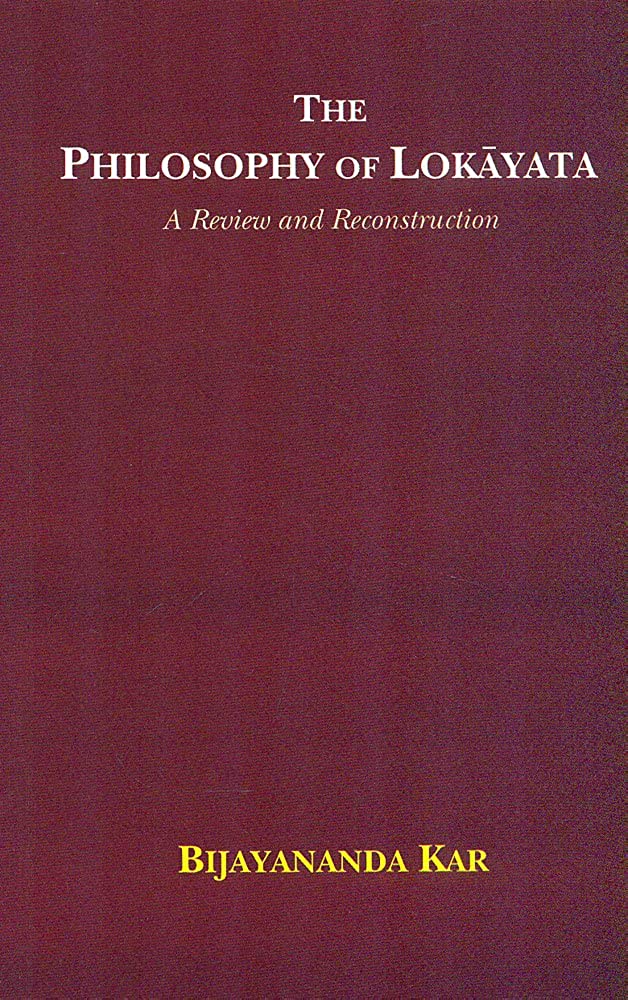The Philosophy of Lokayata: A Review and Reconstruction
![]() 100% Genuine New Books
100% Genuine New Books
![]() Fast Shipping with Tracking Number
Fast Shipping with Tracking Number
Secure Payments via UPI, Cards & Wallets
![]() Trusted Support & Easy Returns
Trusted Support & Easy Returns
The Philosophy of Lokayata: A Review and Reconstruction - Paperback is backordered and will ship as soon as it is back in stock.
ISBN : 9788120836921, 8120836928, 9788120840706, 8120840704
Year of Publication : 2013
Edition : 1st
No. of Pages : 144
Language : English
Condition : New
Publisher: Motilal Banarsidass Publishing House
Free shipping on orders over Rs. 249
Free shipping on orders over Rs. 249
We offer free shipping on orders above Rs. 249 in India. For orders below this threshold, a nominal shipping fee may apply, which will be clearly indicated during the checkout process.
How long will it take to receive my order?
How long will it take to receive my order?
The delivery time varies depending on your location. Generally, orders are processed and shipped within 1-3 business days. Once shipped, you can track and expect your order to arrive within 3-7 business days (the duration may vary depending on your location). For more information, please refer to our shipping policy.
Chat with a Real Person
Chat with a Real Person
WhatsApp chat is dedicated to assisting with after-sales queries regarding delivery, returns, and payments. Click below to initiate chat with us on WhatsApp:
[Bookstaa WhatsApp Chat].
For all other inquiries, please visit our customer support page or email us at support@bookstaa.com.
Couldn't load pickup availability
Description
Description
The Carvaka/Lokayata darsana is found to have a notable place in the classical Indian philosophical tradition. Its reference is found in the earliest sources like the Vedas/Upanisads, the Buddhist suttas, the Jaina treatises, the Ramayana and the Mahabharata, inclusive of some puranic and sastric works. It goes without saying that, by and large, such references mostly present a very negative and damaging account of the Carvaka point of view. From such sources, certain aphorisms (sutras)are cited as the composition of the founder of the Carvaka darsana, Brhaspati.
The name is not found to refer to one single person. There are two different individuals, having two distinct views, referred to in the Vedic source. The Vedic hymn (X.71-72) refers to Brhaspati Angirasa and Brhaspati Laukya. The former is said to be the priest (purohita) of devas (including Indra) and the latter may possibly be pointing to another person who is represented as instructor to the demons. This point is confirmed when in the later Maitrayana Upanisad it is held that Brhaspati is none other than Sukracarya, the priest and instructor of demons (asuras). It is quite likely that in order to downgrade the contribution of the Carvaka point of view, there was the attempt in some of the Upanisadic sources to vilify Brhaspati as the instructor of demons, instead of gods.
It is needless to point out that the philosophy of Carvaka has been dealt with a cursory treatment in traditional Indian philosophical literature. Even in modern writings, there are (barring few exceptions) not much philosophical probing to bring to focus the logical foundation of the Carvaka point of view. Paucity of original source-material is, of course, an impediment for such investigation. But, nevertheless, attempts have been made by few researchers to present a viable account of the Carvaka stand, scanning out the unsound filthy
observations, especially made by the opponents. From the available source-materials, it is found that the Carvakas have some points to offer with regard to the major issues like knowledge, belief, dogma, the concept of God, soul and morality in the socio-human empirical framework. The author has made an effort to analyze the issues in the light of the Carvakian standpoint. To him it appears that the reading of materialism in respect of the philosophy of Carvaka definitely needs reconsideration. In the present work, he has placed his reasons against the materialistic rendering of the Carvaka stand.
Review(s)
About the Author(s)
Dr. Bijayananda Kar (b.1940) is the former Professor of the P.G. Deptt. of special assistance in Philosophy (now Centre of Advanced Study), Utkal University, Bhubaneswar. He has also been the General President of All Odisha Philosophy Association (2000) and also General President of the Indian Philosophical Congress (2007). He has been awarded with a number of fellowships and has lectured in many countries across Asia, Europe, North America and Australia. He has so far published 16 books and around 200 papers, etc. in different Journals and those are reviewed and referred to both in India and abroad.
About the Publisher

Motilal Banarsidass Publishing House (MLBD)
Motilal Banarsidass Publishing House, popularly known as MLBD, is one of the oldest and most prestigious publishing houses in India, established in 1903.
With over a century of legacy, MLBD has been at the forefront of publishing scholarly works in the fields of Indology, Sanskrit, philosophy, religion, spirituality, yoga, Buddhism, and Jainism.
Renowned for its authenticity and academic rigour, MLBD's books are trusted by researchers, scholars, and readers across the globe.
With more than 5,000 titles in circulation, MLBD continues to uphold its commitment to preserving and promoting India’s rich cultural and philosophical heritage.
Bookstaa is an authorized distributor of MLBD books, ensuring 100% genuine and original publications for our readers.

